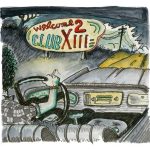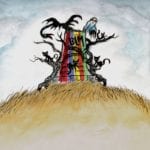Drive-By Truckers – The Dirty South
The Drive-By Truckers established themselves as the fiercest contemporary incarnation of southern rock in 2001 with Southern Rock Opera, a sprawling, 20-song, two-CD opus that weighed in on what they referred to as “the duality of the southern thing.” Last year they followed up with Decoration Day, a step forward in musical sophistication that pointed in a slightly calmer, more contemplative direction, with some pretty complex ideas and emotions running through it.
The band also consolidated its best ever lineup when founding members Patterson Hood and Mike Cooley brought on fellow North Alabama native Jason Isbell to create a roaring triumvirate of singer-songwriter guitarists, held together by stalwart drummer Brad Morgan and simpatico bassist Shonna Tucker.
The result of three years of change and growth is the Truckers’ best-sounding and most assured recording yet. Despite its title, The Dirty South moves the band up from the pigeonhole of southern rock and finally places them firmly among the great exponents of what can only be called American music.
Oh, there’s a whole mess of regionally inspired melodrama to be found among the fourteen songs here — heaps of agony, piled up, picked over and told about with a deliberate drawl. But there’s also the ecstasy of pure hard rock — the urge to obliterate all the crap in one big sonic boom. “Turn it up to 10 and rip off the knob,” Hood instructs.
You can picture his jester’s grin as the opening track explodes in moonshine-sick yowls from the place “Where The Devil Don’t Stay”. From the first menacing major chords, Cooley’s song kicks in with pounding drums and a relentless, brain-needling slide figure that summons the whole of the Truckers’ sound, and for the first time comes close to replicating the atmospheric thundering of the band’s live shows.
Hood’s elegiac “Tornadoes” comes next, with pianos swelling like storm clouds and an existential survivor’s lament: “It sounded like a train.” Then it’s Isbell’s turn to elevate things with “The Day John Henry Died”, a strumming retelling of the archetypal American fable, with a clever twist that describes the plight of today’s working class.
Cooley offers up “Carl Perkins’ Cadillac”, a dark tale of the music biz disguised as giddy ode to “Mr. Phillips” and the early days of Sun Records. And in “Puttin’ People On The Moon”, “Sands Of Iwo Jima” and “Boys From Alabama”, Hood reels out gritty history lessons about people whose lives rarely get noticed.
But it’s Isbell’s worried bit of hero worship, “Danko/Manuel”, that instinctively places the Truckers in the gothic world The Band once documented so well. It’s a dangerous, mythic place, where bad things happen: Men get pissed, guns get drawn, cars get wrecked — or worse yet, love leaves and only loneliness is left to linger before it all fades to black.
As Leslie Fielder argued in Love And Death In The American Novel, the gothic form has always been employed by the best American writers: “Its machinery and decor translated into metaphors for terror psychological, social and metaphysical.” That the Drive-By Truckers use it so well, reveling in the lurid and shadowy realm they call The Dirty South and making it into the kind of musical theater that’s at the heart of the best rock ‘n’ roll, shows how far the band has come. And it’s another reason to wonder how far they can go from here.




